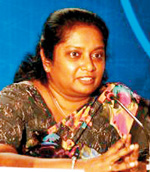Electronic and Telecom Engineering Dept. University of Moratuwa pioneers telecom education and research in Sri Lanka – Special Report
The Department of Electronic and Telecommunication Engineering, University of Moratuwa, is the pioneer in telecommunications education and research in Sri Lanka. Established as a unique discipline in the Sri Lankan higher education system in 1969, the programme has produced engineers, which took the Sri Lankan telecommunications industry through several remarkable revolutions, including the establishment of satellite communications, cellular networks and the Internet. In the early 1990s, the need of the hour was wireless. The department rose to the challenge, producing graduates that would spearhead the spread of mobile services, bridging the digital divide across the country for the next 20 years.

Prof. Dileeka Dias
The department’s telecommunications group is committed to providing a world-class experience to its undergraduates, to extending the boundaries of knowledge through research, to societal benefits through practical implementations and to future leadership development through promotion of entrepreneurship.
The group includes senior academic staff with qualifications and expertise covering aspects of telecommunications such as modulation and coding, optical communications, broadcasting, electronic navigation, broadband technologies and telecommunications policy and management. The group has been strengthened by the addition of a number of recently returning PhDs and is expected to continue to grow.
Projects
Among the key achievements of the Department are the hosting of the Dialog-University of Moratuwa Mobile Communications Research Laboratory and SchoolNet. The former is the first ever industry-sponsored lab in a University in Sri Lanka, and carries out applied research and development in mobile and Internet technologies. SchoolNet is an island-wide computer network connecting over 1,750 schools and other educational organizations, with the Network Operation Centre hosted in the Department from 2006 to 2012.
Recognising that, for education at tertiary level to be relevant, students need hands-on experience in putting their knowledge to work in timely applications, we encourage challenging student projects, often working hand-in-hand with industry. Recent student projects include a wide-area monitoring network for distribution substations of a major utility provider, a solution for controlled access to cellular networks, a Bluetooth low energy (BLE, Bluetooth Smart) platform for education/gaming, a smart building application, and tools for resource planning in 3G (third generation) networks.
Postgraduate students in telecommunications are supported by research grants awarded by the University and the National Research Council (NRC), and industry funding. Research areas currently funded include Wireless Sensor Networks and Vehicle-to-Vehicle Communications. We also conduct a M.Sc. course in Telecommunications.
The telecommunications group derives synergy through liaising with the FPGA (Field Programmable Gate Array) experts in the department. FPGAs are reconfigurable electronic circuits, which can be customised to perform different functions by the user. Students implement communications algorithms and systems such as next generation video coding algorithms and signal processing algorithms related to 4G (fourth generation) mobile systems, on FPGA platforms. They learn fundamentals, evaluate their performance and dig deeper into research towards improving them in these activities.
SDR systems
Among the latest acquisitions to the department’s telecommunications laboratory are a number of Software-Defined Radio (SDR) systems. These are reconfigurable radio platforms driven by signals and protocols implemented in software. For example, the same SDR may be used to listen to FM radio in one instance and watch TV in the next by changing only the software application. SDR platforms allow students to experiment with radio communications systems. Our first experiment on SDR, a complete cellular base station on an embedded device (a Raspberry Pi) was recently demonstrated successfully by final year undergraduates. Our students, being the cream-of-the-cream, are able to learn and work with these complex, versatile platforms, which are yet to gain widespread use even in highly ranked universities worldwide.
Today, the local telecommunications industry considers the department as its source of finest new talent for recruitment. The department’s graduates find positions for postgraduate study with prestigious international telecommunications research groups. The government as well as the private sector often seeks consultancy services from the department.
5G
Looking to the future, the department plans to extend its work in wireless communications to the 5G (fifth generation) arena. 5G is the next generation of mobile communications standards, expected to be rolled out in 2020. In addition to providing users with enhanced data rates, 5G will enable the Internet of Things (IoT), where billions of physical devices with embedded electronics, sensors and software communicate with each other without human interaction. It will also provide broadcast-like services and envisages lower infrastructure deployment cost. Candidate technologies for 5G standards are an intense area of research globally.
Towards this end, we have established collaboration with prestigious international research groups. This will enable the student community to be exposed to the cutting edge in the field, where even influencing technology standards of the future would be possible.
Employment
During the rapid expansion of the local mobile industry, as much as 80 per cent of our graduates found employment with telecom operators. At present, 15 to 20 per cent fill core technical positions, especially in network planning. The department has taken measures to re-align its program from a core telecommunications focus towards new developments in the industry such as IoT and Machine-to-Machine (M2M) communications. These are ideally aligned with the historic strength of the department in blending Electronics with Telecommunications, as well as with the evolving 5G wireless technologies.
The writer is the Dean of the Faculty of Graduate Studies at the University of Moratuwa, and a former Head of the university’s Department of Electronic and Telecommunication Engineering. She can be contacted at
dileeka@ent.mrt.ac.lk.


